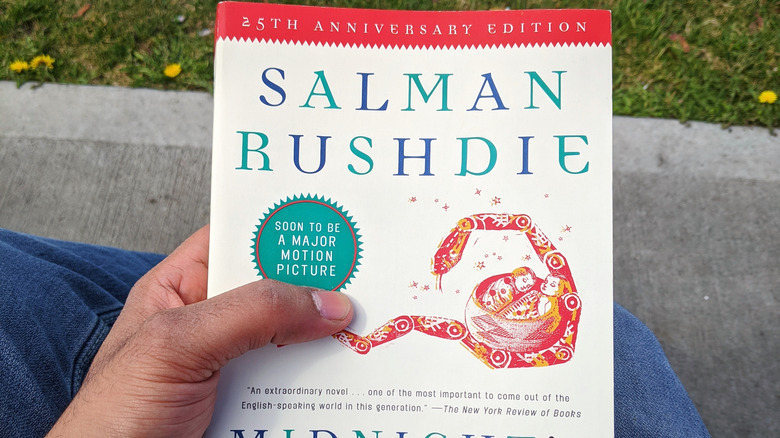The Annual Valentine's Day Card Salman Rushdie Would Rather Not Get
The Islamic world is one filled with various nuances and complexities. With those nuances come many misconceptions and stereotypes. One often misunderstood concept is the fatwa. Under Islamic law, a fatwa is basically a formal opinion given by an Islamic authority or scholar on a topic, according to Britannica. Given the number of high-profile fatwa death sentences, the fatwa has been skewed into something it is not. Fatwas are not legally binding, and can always be challenged or dismissed, depending on who is following them.
For one man, a fatwa changed his life forever. Salman Rushdie, an Indian-born, British-American novelist, had a fatwa issued against him by Ayatollah Ruhollah Khomeini, an Iranian religious leader, on February 14, 1989. As The Hill explains, this fatwa was issued after Rushdie published "The Satanic Verses," which many Muslim leaders saw as blasphemous, including Khomeini. The fatwa called for Muslims to kill Rushdie. And according to Rushdie, Iran sent him a reminder of the fatwa every year, which he has referred to as his "unfunny valentine" (via I News).
Why Salman Rushdie has a death sentence on his head
Salman Rushdie is an accomplished novelist who has penned influential, postcolonial literary works containing magical realism, among other literary techniques. As reported by The Hill, much of Rushdie's life as a writer has been fraught with controversies, as Rushdie's portrayals of the Prophet Muhammad and Islam have caused a lot of backlash among Muslim leaders. But perhaps the most controversial of Rushdie's entire oeuvre would be his 1988 novel "The Satanic Verses."
According to Britannica, "The Satanic Verses" is a magical realism novel that reportedly satirizes aspects of Islam. The novel is about two Indian Muslim protagonists, Alleluia Cone and Gibreel Farishta, who meet and fall in love with each other. The book was banned by India and several other countries not too long after it was published, despite it being nominated for such awards as the Whitbread Book Award and Booker Prize. The following year, Ayatollah Ruhollah Khomeini issued a fatwa on Rushdie for the work he labeled blasphemous, calling for the execution of Rushdie and anyone involved with publishing and translating the book.
Iran sent him reminders of the fatwa
Since the fatwa was issued, Salman Rushdie has been wanted dead by those outraged at the blasphemy perceived in his work. As reported by the New Yorker, Rushdie suffered for years from the trauma of the fatwa and had to go into hiding for nine years. Rushdie even said that Iran still sends him a reminder of the fatwa every year, which he calls "my unfunny valentine." Although the Iranian government published a conciliatory statement in 1998, the fatwa remains in place, according to I News.
Unfortunately for Rushdie, the damage of the decades-old fatwa was already done. On August 12, 2022, the novelist was stabbed multiple times by an assailant while he was on stage. As The New York Times says, the motive for this is still unknown, but there might be strong connections to the fatwa, along with Iran, and "The Satanic Verses." Currently, as reported, Rushdie is on a ventilator, as his liver and one of his eyes were badly damaged.


